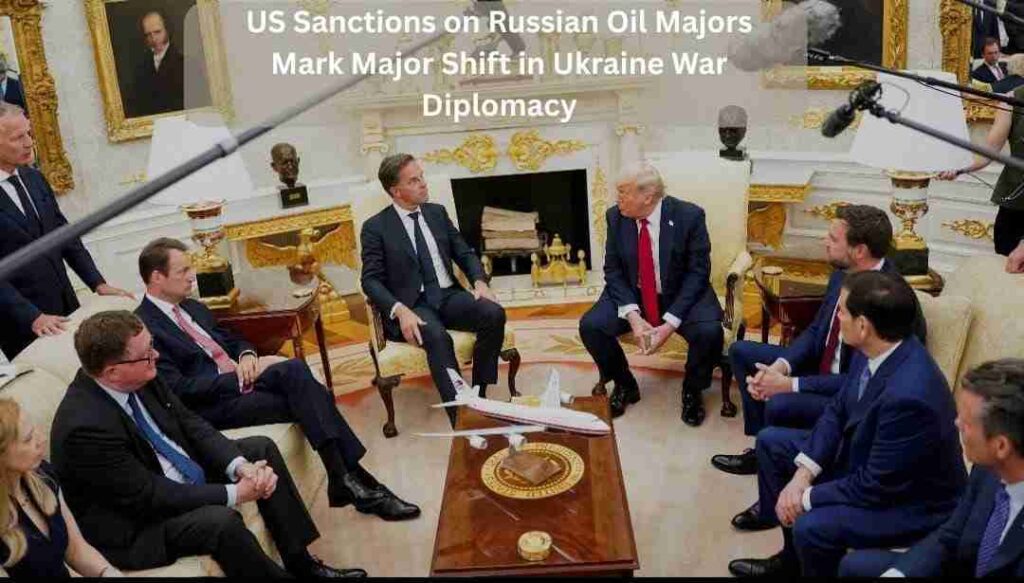US Targets Russia’s Oil Titans With Sweeping Sanctions — A Bid to Restart Ukraine Peace Talks

In a dramatic shift in U.S. foreign policy, the United States has announced comprehensive sanctions on Russia’s two biggest oil companies — Rosneft PJSC and Lukoil PJSC — in an effort to push Moscow back to the negotiation table over the ongoing war in Ukraine.
The move, personally unveiled by President Donald Trump at the White House on Wednesday, represents one of Washington’s most direct economic strikes on Russia since the invasion began nearly four years ago. Officials say the goal is not punishment for its own sake, but to “encourage genuine steps toward peace.”
A Turning Point After Months of Reluctance
For much of the year, the Trump administration had avoided direct sanctions on Russia’s vital energy sector, even as pressure mounted from NATO allies and members of Congress. The hesitation stemmed from concerns that penalizing Russian oil could destabilize global markets and spike fuel costs worldwide.
But that approach ended this week. The White House said in a formal statement that the decision was taken after Moscow showed “no meaningful engagement” in peace negotiations to end hostilities in Ukraine.
Rosneft and Lukoil together account for nearly 50% of Russia’s total crude exports, serving as the economic backbone of the Kremlin. Energy analysts warn that the sanctions could send shockwaves through the international oil trade, affecting everything from fuel prices to shipping routes.
“It Was Time,” Says Trump
Speaking in the Oval Office alongside NATO Secretary General Mark Rutte, President Trump said the move was necessary after months of inaction.
“I just felt it was time,” Trump told reporters. “We’re not trying to hurt the Russian people — the goal here is simple: to create the right conditions for peace in Ukraine.”
Under the new restrictions, American individuals and companies are banned from conducting business with Rosneft or Lukoil. The penalties extend to financial transactions, partnerships, and new investments.
Rosneft’s CEO Igor Sechin, one of President Vladimir Putin’s closest allies, has long been a target of Western sanctions. Lukoil, though privately owned, remains one of Russia’s most influential global energy players.
A Sharp Reversal of Trump’s Earlier Position
This marks a striking reversal for President Trump, who previously resisted sanctions and publicly claimed he could “end the Ukraine war in a single day.”
Earlier this year, Trump and Putin met during a high-profile summit in Alaska, but the talks ended without progress. Washington later issued a 10-day ultimatum in July, urging Moscow to make concrete peace commitments — a warning that went unanswered.
Now, with the latest sanctions, the U.S. administration appears determined to project strength and urgency as winter approaches — traditionally a season of increased energy dependency in Europe.
Summit With Putin Put on Hold
The sanctions have also derailed a planned Trump-Putin meeting that was set to take place in Budapest, Hungary, later this year.
“Every time I talk to Vladimir, it’s a good conversation,” Trump said. “But then nothing really happens. We’ll meet again — but only when the time is right.”
Officials close to the White House confirmed that no new date has been proposed for the summit.
Interestingly, former President Joe Biden had weighed similar sanctions in the final months of his term but decided against them, fearing that such a move could send global oil prices skyrocketing at a time when inflation was already high.
Global Oil Markets React Immediately
Energy traders wasted no time reacting. Overnight, Brent crude futures surged by 5%, while West Texas Intermediate (WTI) rose 2.5%, hovering near $60 a barrel.
The price jump reflects concerns that the sanctions could tighten supply if Russia’s exports are disrupted. Some analysts predict that prices could remain elevated through the holiday season, especially if Moscow retaliates with its own trade restrictions or cuts in supply.
Economists note that Russia remains one of the top three global energy suppliers, meaning even partial disruptions could ripple across world markets, from Europe’s fuel stations to Asia’s manufacturing hubs.
Strategic Gamble or Diplomatic Breakthrough?
The big question now: Will these sanctions work?
Supporters argue that economic pressure remains the most effective tool for bringing Moscow to the negotiating table. By targeting the lifeblood of Russia’s economy — oil revenues — Washington hopes to create incentives for peace without resorting to direct military confrontation.
Critics, however, caution that such sanctions might deepen Moscow’s alliances with Beijing and New Delhi, two nations that have steadily increased their energy trade with Russia despite Western restrictions.
Some experts believe the move could accelerate the formation of a parallel oil network — with Russia offering steep discounts to Asian buyers while bypassing Western financial systems.
What Lies Ahead
The next few weeks will be crucial. U.S. officials are reportedly in talks with European and Asian allies to coordinate further measures and prevent the emergence of loopholes that could undermine the sanctions.
Meanwhile, the Kremlin has yet to issue an official response, though Russian state media have already accused Washington of “economic aggression.”
For now, the global community is watching closely — waiting to see whether this bold step from Washington will finally bring momentum toward peace in Ukraine, or simply trigger another round of geopolitical brinkmanship.



